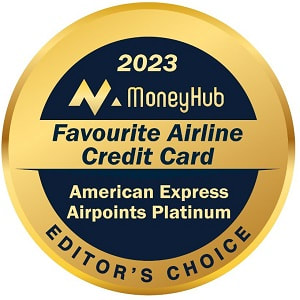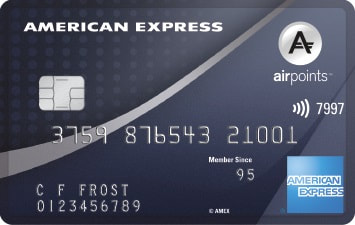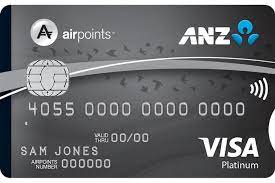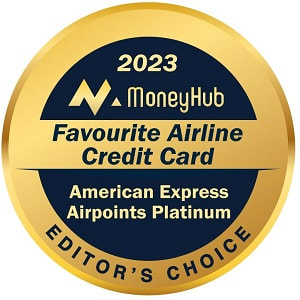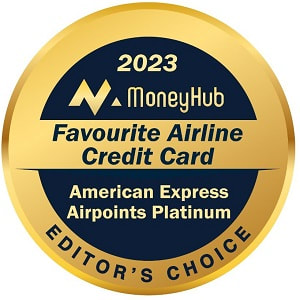ANZ Airpoints Visa Platinum vs American Express Airpoints Platinum
We compare the popular ANZ Airpoints Visa Platinum and the AMEX Airpoints Platinum cards, examining each card's features, fees, advantages, and disadvantages to help you determine which option best suits your needs.
Updated 4 July 2024
Summary
Summary
- This guide compares the popular ANZ Airpoints Visa Platinum with AMEX's Airpoints Platinum card. Both earn Airpoints Dollars, but the earning rates are vastly different despite a similar annual fee.
- We estimate over 100,000 New Zealanders hold the ANZ card, but the benefits have been cut back since late 2022. The most significant development is the drop in earn rates. If you're an ANZ cardholder, we suggest reading on to explore the alternatives.
- The ANZ Airpoints Visa Platinum earns around 46% fewer Airpoints Dollars per $1 spent than the American Express Airpoints Platinum Card. The more you spend each month, the fewer Airpoints Dollars you earn relative to the AMEX option.
- Our comparison looks at the true cost of holding both cards and how much you'll be rewarded for a range of annual spending. We have written our comparison to appeal to existing ANZ Airpoints Visa Platinum cardholders to help explain the key differences.
- Update: For the American Express Airpoints Platinum card, the current $59 spend = 1 Airpoints Dollar rate is valid until 2nd October 2024. From 3rd October 2024, the rate will change to $70 spend = 1 Airpoints Dollar. For the purposes of this guide, we have used the 1:70 rate.
Christopher Walsh, MoneyHub's Founder and Head of Research, shares his views on earning Airpoints Dollars with both the ANZ and American Express Platinum cards:"Airpoints is one of the most useful loyalty programs in New Zealand, but things have changed for platinum cardholders, and bank customers are suddenly much worse off. Based on the numbers outlined below, I argue that ANZ-branded cards offer a poor deal compared to AMEX's offering. However, that doesn't mean AMEX is a sure bet - card acceptance outside of main retailers can be hit or miss, which means New Zealanders often need to rely on a backup credit card.
Nonetheless, ANZ has cut the Airpoints earning rate significantly, and it's unlikely to return to where it was. Adding more frustration, it's ended all Koru vouchers and status points earning (per dollar spent). The result is a high annual fee card that only starts covering its costs after you spend $16,500 a year. However, by then, the AMEX card has served up almost double the Airpoints dollars, a slew of status points, lounge vouchers and other perks. We've published this guide to help you challenge ANZ's offering and determine whether it still delivers the best value for your needs. I continue to challenge the banks on their appalling savings rates (see my Stuff.co.nz column here). I firmly believe that until they become more competitive (which is unlikely), American Express is the most rewarding card on the market by quite some margin". |
Christopher Walsh
MoneyHub Founder and Head of Research |
To help you know all the facts and make an informed decision, our guide covers the following:
Advertising Disclaimer: MoneyHub may earn a referral bonus for anyone that’s approved through some of the below links. Our research and findings are independent of any bank, credit card issuer, or product manufacturer/service provider, and have not been endorsed by any of these entities. Please see our Advertising Policy for more details about how we make money.
Our video below explains this guide in detail and outlines the specific differences between ANZ and AMEX's Airpoints Platinum offerings:
- ANZ and AMEX Airpoints Platinum Cards Side-by-Side
- Airpoints-Earning Platinum Cards in Nutshell
- Pros, Cons and Must-Know Facts of Using an AMEX Card
- AMEX Testimonials
- Our Conclusion
Advertising Disclaimer: MoneyHub may earn a referral bonus for anyone that’s approved through some of the below links. Our research and findings are independent of any bank, credit card issuer, or product manufacturer/service provider, and have not been endorsed by any of these entities. Please see our Advertising Policy for more details about how we make money.
Our video below explains this guide in detail and outlines the specific differences between ANZ and AMEX's Airpoints Platinum offerings:
ANZ Airpoints Visa Platinum vs American Express Airpoints Platinum - Side-by-Side:
Each card has a unique Airpoints Dollars earning rate and specific differences, outlined below:
Features |
||
Earning Rate |
$70 spent = 1 Airpoints Dollar |
$110 spent = 1 Airpoints Dollar |
Bonus Airpoints Dollars |
300 bonus Airpoints Dollars when you apply, are approved and spend $1,500 on your new Card within the first 3 months. New Card Members only. |
None |
Annual Fee |
$195 (no charge for supplementary cards) |
$150 (supplementary cards are an additional $5/year) |
Status Points |
$250 spent = 1 Status Point |
None earned from spend Cardholders receive 50% bonus status points on Air New Zealand flights |
Insurance Benefits |
Domestic and International Cover |
International Cover |
Interest-Free Days |
Up to 55 Days |
Up to 44 Days |
Interest Rate |
22.95% p.a. on purchases |
19.95% p.a. on purchases |
Lounge Access |
Four vouchers per year (two in Auckland, and two in Australia) |
None |
Airpoints Earned Per Year from $3,000 Monthly Spend |
514 (and 144 Status Points) |
327 (no Status Points are earned on card spend) |
Airpoints Earned Per Year from $5,000 Monthly Spend |
857 (and 240 Status Points) |
545 (no Status Points are earned on card spend) |
Airpoints Earned Per Year from $10,000 Monthly Spend |
1714 (and 480 Status Points) |
1090 (no Status Points are earned on card spend) |
Annual Spend Required to Earn Enough Airpoints Dollars to Offset the Annual Card Fee |
$13,650 (excluding the 300 Airpoints Dollars signup bonus for new applicants, which arguably offsets 1.5 years of card annual fees) |
$16,500 |
More Information |
ANZ vs AMEX Card Comparison - Findings, Highlights and What to be Aware Of:
- AMEX outperforms ANZ: AMEX earns almost double to number of Airpoints Dollars per dollar spent compared to ANZ, and we believe this makes AMEX the strongest card despite some limitations around acceptance in smaller retailers.
- The AMEX card is cheaper to hold: Based on the numbers above, if you use the American Express Airpoints Platinum Card, you'll need to spend around $13,650 to generate 195 Airpoints Dollars to "offset" the annual $195 fee. However, given the much lower earning rate, you'll need to spend $16,500 on the ANZ card.
- AMEX offers Status Points on spend whereas ANZ doesn't: AMEX's Status Point earning opportunities are generous. Cardholders can benefit from a constant boost as they spend, making it easier to re-qualify for Air New Zealand Gold (or similar). However, it isn't easy to quantify ANZ's 50% Status Point bonus benefit. While it will be valuable domestically, many New Zealanders credit Singapore Airlines, United Airlines, Air Canada and Lufthansa Group ticketed flights to their Airpoints account not eligible for the 50% bonus.
- Overall, AMEX offers far more benefits: If you spend over $1,000 a month on a credit card and always repay the balance after each month, the AMEX option offers tremendous benefits such as lounge access for international trips, comprehensive domestic and international travel insurance, a signup bonus, status points and comfort knowing you're earning the highest amount of Airpoints Dollars every time you use a card. No other card comes close.
- Apple Pay compatibility: AMEX supports Apple Pay in New Zealand, an enhancement launched in early 2024.
Other important differences to be aware of:
- Customer service: AMEX is known for its exceptional customer service, as evidenced in our testimonials below, as well as in our chargebacks guide. The difference with the ANZ is that you deal directly with the credit card company and don't need to go via a bank. There's an 0800 number operating from 9am to 6pm, Monday to Friday. ANZ offers an 0800 number and operates 8am - 7pm Monday to Friday and 9am to 5pm Saturday and Sunday.
- Supplementary cardholders: AMEX does not charge an annual fee for supplementary cardholders, while ANZ charges $5/year for supplementary cards. This is relevant for those looking to add their partners or family members to their account as it's an added ongoing cost for ANZ customers.
- Payment options: ANZ and AMEX accept payments via direct debit and online banking transfers and over the phone. With ANZ, you can also pay in a branch.
- FX fees: ANZ charges 1.30% on non-NZD transactions, whereas AMEX charges 2.50%, so if you're using your card extensively overseas, the 1.20% difference eats up any extra Airpoints Dollars earned.
- Eligibility Criteria: ANZ and AMEX require applicants with a good credit history and the ability to pay balances in full. There is no minimum salary requirement.
- Application Process: ANZ and AMEX will require bank statements and ID scans to prove income and other documents in specific cases.
- Koru membership: Both cards discount the annual membership and waive the joining fee. You can read more about Koru and whether it's worth the cost here.
- Fraud protection: ANZ and AMEX offer 24/7 fraud helplines, account alerts and real-time transaction monitoring. You can read the policies in detail from ANZ and AMEX.
- Payment networks: American Express operates its own payment network, which may impact acceptance rates compared to Visa (and Mastercard). This could be a factor when considering which card to choose, depending on where you plan to use it.
- Card design and material: ANZ and AMEX's Platinum-level Airpoints cards are designed in plastic and appear per the imagery on this comparison.
- Redemption options: Airpoints Dollars can be redeemed when booking flights, upgrading seats, or purchasing items through the Airpoints Store. Our guide to spending Airpoints Dollars has more details.
Important: We have not covered balance transfer offers or late payment fees, as this comparison is designed for anyone who consistently repays their monthly balance in full when due and maximises the value of the benefits earned as a result of doing so.
Christopher Walsh MoneyHub Founder and Head of Research outlines a value-based summary of the two cards:
|
Christopher Walsh
MoneyHub Founder and Head of Research |
"AMEX earns almost double the number of Airpoints Dollars per dollar spent compared to ANZ, making it the strongest card despite some acceptance limitations in smaller retailers and eateries. For this reason, it's our 2023 Editor's Choice Favourite Airline Credit Card.
The American Express Airpoints Platinum Card requires around $13,650 in spending to offset its $195 annual fee, compared to $16,500 for the ANZ card, making the AMEX card more cost-effective. And that's before adding up the value of lounge benefits and sign-up bonuses. If you're Air NZ Gold (or want to achieve it), AMEX's generous Status Point earning opportunities will make earning Status Points easier than ANZ's 50% Status Point bonus benefit (when flying Air New Zealand). For those spending over $1,000 a month on a credit card and always repay the balance, the AMEX card offers unmatched benefits, such as lounge access, travel insurance, a signup bonus, and the highest Airpoints Dollars earning rate." |
Airpoints-Earning Platinum Cards in Nutshell - ANZ Airpoints Visa Platinum vs AMEX Airpoints Platinum
We outline the fees, interest rates, bonus offers and perks of each card:
The American Express Airpoints Platinum CardBasics:
Annual Fee: $195 Annual percentage interest rate: 22.95% p.a. Interest Free Period: up to 55 days Bonus Offer: 300 bonus Airpoints Dollars when you apply, are approved and spend $1,500 on your new Card within the first 3 months. New Card Members only. Read more: Airpoints Platinum Review Benefits:
Learn more or apply |
ANZ Airpoints Visa PlatinumBasics:
Annual Fee: $150 Annual percentage interest rate: 19.95% p.a. Interest Free Period: up to 44 days Bonus Offer: None Benefits:
Learn more or apply |
Christopher Walsh MoneyHub Founder and Head of Research outlines a value-based summary of the two cards:
|
Christopher Walsh
MoneyHub Founder and Head of Research |
"AMEX earns almost double the number of Airpoints Dollars per dollar spent compared to ANZ, making it the strongest card despite some acceptance limitations in smaller retailers. For this reason, it's our 2023 Editor's Choice Favourite Airline Credit Card.
The American Express Airpoints Platinum Card requires around $13,650 in spending to offset its $195 annual fee, compared to $16,500 for the ANZ card, making the AMEX card more cost-effective. And that's before adding up the value of lounge benefits and sign-up bonuses. If you're Air NZ Gold (or want to achieve it), AMEX's generous Status Point earning opportunities will make earning Status Points easier than ANZ's 50% Status Point bonus benefit (when flying Air New Zealand). For those spending over $1,000 a month on a credit card and always repay the balance, the AMEX card offers unmatched benefits, such as lounge access, travel insurance, a signup bonus, and the highest Airpoints Dollars earning rate." |
Pros, Cons and Must-Know Facts of Using an AMEX Card
If you're thinking about switching from ANZ to AMEX, we've listed some pros, cons and facts to help you make an informed decision:
Pros:
Cons:
Must-Know Facts:
Pros:
- More and more stores accept AMEX - our guide explains more. Even if you see a Visa & Mastercard logo on the door or at the checkout, that doesn't mean AMEX isn't accepted
- Paypal accepts AMEX, even if the retailer doesn't. This means you can link an AMEX card to PayPal, charge the purchase, and earn Airpoints Dollars.
- Apple Pay compatibility: AMEX supports Apple Pay in New Zealand, an enhancement launched in early 2024.
Cons:
- Acceptance - despite being widely accepted by big retailers, smaller retailers often don't accept American Express cards. Unfortunately, this means you'll need to ask, "do you take AMEX?" when shopping outside of major stores, and the prospect of doing so may become annoying.
Must-Know Facts:
- Forex fees can add up - if you use an American Express card to pay for a non-NZD purchase, you'll pay 2.49% in foreign exchange fees. This adds up, and while it's in line with banks, it is well above the near-0% charged by the Wise debit card. Even if you get 1% or 1.70% back in rewards, you are still paying above-market FX fees when a challenger product like Wise minimises the FX costs.
- AMEX supplementary cards are free. This means if you have a partner, both of you can use the card and earn Airpoints Dollars. For example, if you each spend $15,000 a year, then you'll earn an extra 214 Airpoints Dollars.
AMEX Testimonials
While you may be well-acquainted with your bank's operations, AMEX could be a new experience. To provide insight, we asked MoneyHub users in March 2023 to share their firsthand experiences with the AMEX Airpoints Platinum card. The testimonials below highlight various aspects, including the application process, online account management, customer support satisfaction, earning rewards, and merchant acceptance.
- "I've had a fantastic experience with my AMEX card! I've accumulated a significant amount of Airpoints Dollars, which seem more rewarding than with my previous cards. I've even had the opportunity to enjoy the Amex lounge at Sydney Airport. The card is easy to use, although not all places accept it. The app could use some improvements, but it gets the job done. I would highly recommend AMEX over other credit cards, mainly because of the rewards".
- "I've been using an American Express card for over 40 years and have had a very positive experience. Their customer service is exceptional - helpful, friendly, and you get to speak directly with a human! They offer a wide range of incentives and an essential benefit: points never expire. They've been working hard to increase the number of outlets accepting Amex, but it's still necessary to have a Mastercard or Visa for complete coverage. My only issue is their travel insurance policy, which doesn't offer coverage for pre-existing conditions at an additional cost, unlike Mastercard".
- "I've had an Amex card for over 10 years and switched to the American Express Airpoints Platinum Card a couple of years ago. I'm very happy with the card and rewards. I've noticed more places accepting Amex over time".
- "AMEX provides excellent customer service, with quick phone responses and readily available live chat. The card comes with great perks like lounge access, which I've fully utilized this year. It's not widely accepted at independent stores and restaurants, but I use it for supermarkets, gas stations, and online shopping, earning enough Airpoints for a return ticket to Tokyo. As long as the earn rate remains at $100/A1, I'll keep renewing the card".
Our Conclusion
- In conclusion, when comparing the ANZ Airpoints Visa Platinum and the American Express Airpoints Platinum cards, the latter emerges as a significantly more rewarding option for credit card users in New Zealand.
- Despite similar annual fees, the AMEX Airpoints Platinum card offers a substantially higher earning rate for Airpoints Dollars, which leads to greater rewards for cardholders. Additionally, the AMEX card provides more benefits, such as lounge access, comprehensive international and domestic travel insurance, status points, and a generous signup bonus.
- However, it is crucial to note that the AMEX card has some limitations, including lower acceptance rates at smaller retailers and a higher foreign exchange fee than the ANZ card. This may lead some users to rely on a backup credit card
- Despite these drawbacks, the AMEX option still stands out as the more rewarding choice, especially for those who spend over $1,000 monthly on their credit card and pay off the balance each month.
- The ANZ Airpoints Visa Platinum card has experienced significant cutbacks since late 2022, including decreased earning rates and discontinued Koru vouchers and status points earning. As a result, the card's value has diminished considerably. This means that the AMEX card offers more benefits, requires a lower annual spend to offset the card fee, and has a higher earning rate, making it a superior choice overall.
- Ultimately, the decision between the ANZ Airpoints Visa Platinum and the AMEX Airpoints Platinum cards will depend on individual spending habits, preferences, and requirements. However, for those who prioritize earning Airpoints Dollars and maximizing the value of their credit card, the American Express Airpoints Platinum card is the clear winner.
Christopher Walsh MoneyHub Founder and Head of Research outlines a value-based summary of the two cards:
|
Christopher Walsh
MoneyHub Founder and Head of Research |
"AMEX earns almost double the number of Airpoints Dollars per dollar spent compared to ANZ, making it the strongest card despite some acceptance limitations in smaller retailers and eateries. For this reason, it's our 2023 Editor's Choice Favourite Airline Credit Card.
The American Express Airpoints Platinum Card requires around $13,650 in spending to offset its $195 annual fee, compared to $16,500 for the ANZ card, making the AMEX card more cost-effective. And that's before adding up the value of lounge benefits and sign-up bonuses. If you're Air NZ Gold (or want to achieve it), AMEX's generous Status Point earning opportunities will make earning Status Points easier than ANZ's 50% Status Point bonus benefit (when flying Air New Zealand). For those spending over $1,000 a month on a credit card and always repay the balance, the AMEX card offers unmatched benefits, such as lounge access, travel insurance, a signup bonus, and the highest Airpoints Dollars earning rate." |
Related Guides
- Best Airpoints Credit Cards
- Airpoints Platinum Cards Comparison (ANZ vs AMEX vs Kiwibank vs Westpac)
- Kiwibank Airpoints Platinum Visa vs AMEX Airpoints Platinum
- Westpac Airpoints Platinum Mastercard vs AMEX Airpoints Platinum
- Best Rewards Credit Cards
- American Express Airpoints Platinum Card Review
- Best Credit Cards
- Best American Express Credit Cards





